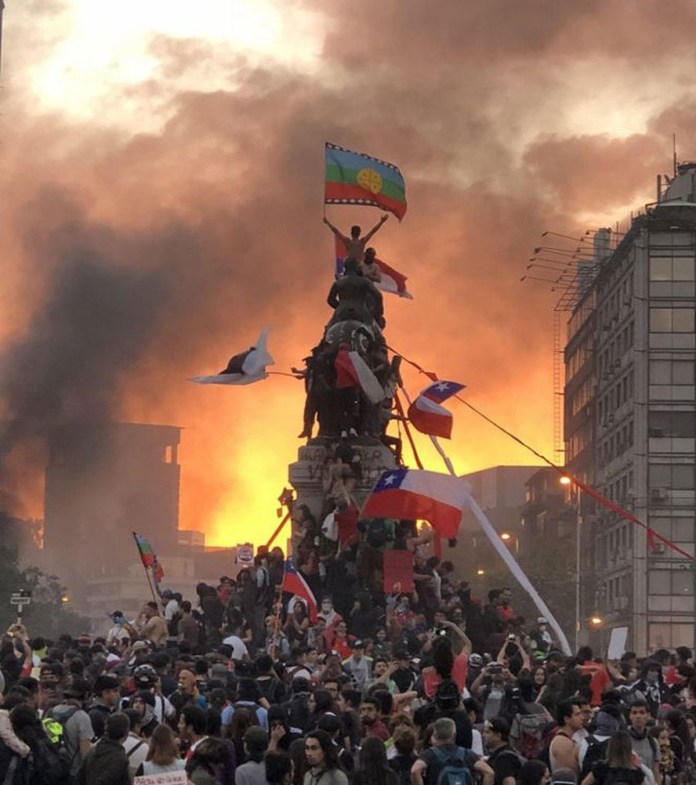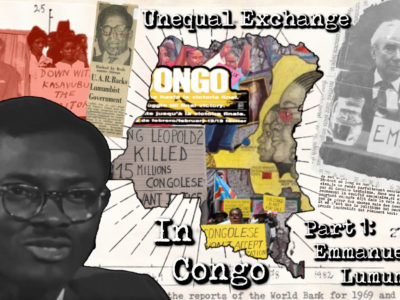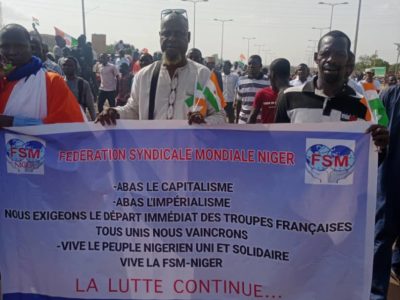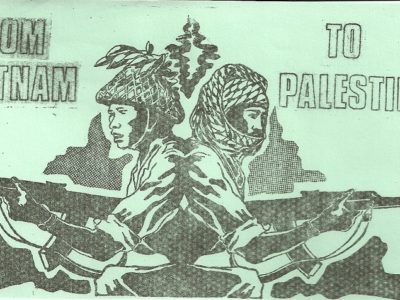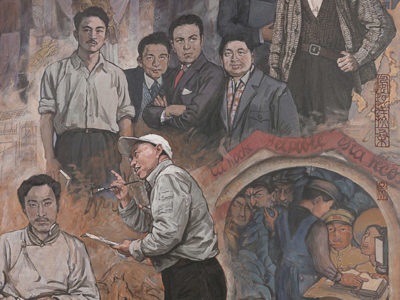The crisis of neoliberalism in the “North”
2019 has been marked by the continuing political crisis of neoliberalism. It divides both people and capital into those who want to return to a more nationally based capitalism and those who wish to continue with the neoliberal globalization. Some of the world’s largest companies such as: Apple, Google, Amazon, Microsoft and the entire electronics industry want to continue the neoliberal globalization. They have established transnational production chains and international institutions that cannot be easily rolled back. The more nationalist forces, on the other hand, want more state, as a bulwark against the consequences of global neoliberalism in the form of job outsourcing, migration and welfare degradation.
The contradiction between transnational capital and the nation state is inherent in neoliberalism. However from around the financial crisis of 2008, the balance of the aspect changes, as nationalism became an increasingly prominent aspect. Since then is has been the principal contradiction in the world, which drives the development of global capitalism. The class basis for a more nationalist capitalism is the “old” industrial working class and lower middle class in the “North”. These groups are supported by national-conservative parts of capital. It is partly sections of capital whose accumulation is primarily nationally based and partly sections of capital, which for political reasons want a return to the strong nation state as basis point for a continued imperialism.
Right-wing populist nationalism has emerged throughout Europe and the United States. Trump’s strategy: “Make America Great Again,” is based on a combination of economic protectionism as well as political and military pressure on competitors. However, Trump cannot just roll back thirty years of neoliberalism; dissolve transnational production chains and institutions. Apple’s electronics, Nike’s shoes and Levi’s jeans will not be produced in the United States as long as US wages are ten times as high as Chinese or Mexican wages. The impact of protectionism and tariff barriers will simply throw rubble into the neoliberal machine, thus creating a deeper economic crisis. In Europe, we see the impact of this contradiction. The EU, which for decades became stronger and otherwise seemed so stable, is beginning to crack. This is not just Brexit. Nationalist “EU sceptics” are on the rise throughout Europe from Italy, France to Germany, the Netherlands, Finland, Denmark Norway, Sweden and Hungary. The institutions, which were built to regulate global capitalism, such as the WTO, are crumbling. The last G-meetings have ended in failure, mainly because of Trump’s lack of “global leadership.” Even in NATO, there is a growing disagreement between the United States and its European allies on the strategy and who should pay for the security of imperialism.
Thus, we have a situation where the main parts of the production apparatus and thus the economic power lie in the hand of neoliberal capitalism, while politics in terms of parliamentary power, is increasingly reinforcing a more nationally based capitalism.
In smaller European countries like Denmark (where I live), the old traditionally political parties are desperately trying to overcome the contradiction between the neoliberal capital’s demands for continued globalization and the large population groups’ demand for more and stronger nation state – a difficult task. In this endeavour, the Social Democratic Party have copied the discourse of the nationalistic Danish People’s Party: “We have to take care of Denmark”. This has given more room to parties on the left wing, seeking to pick up old social democratic positions. However, it is as difficult for them, as it was for the Social Democrats to implement “Keynesian” governance of the national economy, in a world where decades of neoliberalism have outdated the traditional national economic tools.
These nationalistic currents in Europe and the United States seek to compromise workers and capital. However, unlike the social compromise between social democrats and capital, this new compromise is based on an alliance between national conservative sections of capital and right wing populism and thus a more authoritarian state. The more authoritarian state is also legitimized by the rising military rivalry in the world system. A spill over from nationalism. Direct territorial control is again gaining importance to sustain imperialism, as compared to the market forces, which was the main instrument of power in neoliberalism to achieve economic dominance.
The crisis of neoliberalism “South”
The contradiction between neoliberalism and rising nationalism is not only found in the global “North”. It is expressed in Russia in form of the nationalistic political line of Putin. The old conflict between the United States and Russia has returned, now as an inter-imperialistic rivalry. Right-wing nationalism has also got representatives in the global “South”: Narendra Modi in India, Jair Bolsonaro in Brazil, Rodrigo Duterte in the Philippines and Erdoğan in Turkey. The increased national consciousness of the “South” is expressed in new international institutions in opposition to US dominated neoliberalism. Brazil, Russia, India, China and South Africa, have formed the economic-political association called BRICS. A highly mixed group of countries however, with a common ambition of archive independence from the old neoliberal Triad: the US, the EU and Japan – a more multipolar world.
Not least, it is important to follow how the contradiction between neoliberalism and nationalism unfolds in China. China’s opening to the world market in the 1990s created a class of capitalists linked to neoliberalism. However, China still has a significant state capitalist sector and an agricultural sector with more national interests. By continuing neoliberal globalization, the Chinese bourgeoisie and thus China itself could become a fully integrated part of global capitalism. However, the political crisis of neoliberalism has coming in the way for such a development.
China’s economic development has reached a point where it is challenging US domination economically and politically. It was nice as long as China exported cheap toys, household appliances, shoes and textiles. And it was nice as long as Western transnational companies controlled this production. It started to become problematic as China began to become competitive in sectors such as railway equipment, construction machinery and cars. However, it has become serious problem, now that independent Chinese products are gaining market share in electronic devices, biotechnology, G5 networks, robotics, aircraft engineering and internet trading. Illustrated by the US’s attempt to impede Huawei’s advance. At the same time, China is setting up infrastructure projects in Asia, Africa and even Latin America – US backyard. In addition, China is challenging the US dollar as a “world currency” and is pursuing an independent fiscal policy. Losing these market shares and benefits is unacceptable to the United States, especially in the face of a looming economic crisis.
China, for its part, has growing problems on the home front. Access to cheap labour from rural areas is running dry and leads to demands for wage increases. It intensifies the class struggle, between the neoliberal bourgeoisie and the proletariat. They wants a greater share of the goods flowing to the US and the EU. In addition, the population dissatisfied with the gaps in the old social safety net, the skyrocketing price of housing. Air pollution from industry has become a nuisance in the metropoles and water shortages are causing discontent in the countryside. There is pressure on the Chinese government to continue economic growth to curb class contradictions. Thus, there is also a shift in Chinese politics towards the national aspect, which in turn causes the contradiction between the US and China to grow. Neither Xi nor Trump can back off. This situation have led to the ongoing trade war and an increased level of political conflict and military tension between China and the United States. The contradiction between neoliberalism and nationalism in the nation states, spill over into increased rivalry between states.
Just as in the past year, we will in the coming year see how states will try to solve their problems by exporting them the others. If capital just could open new big markets for investment like in the 90s, Xi and Trump would quickly agree. However, such untapped markets no longer exist. Global capitalism is running out of periphery. A proposal to the fuel accumulation would be the redistribution of wealth to generate a bigger home market. Such a “solution” seems easier to realize for Xi than for Trump. However, it would impede the profit rate. Another option is the destruction of capital and opponents in form of war.
Spontaneous rebellion
In addition to rising nationalism, the crisis of neoliberalism has also manifested itself in numerous spontaneous rebellions against deteriorating living conditions, prices on fuel, unemployment, corruption and lack of democracy. The rebellions range from Hong Kong, Thailand, Egypt, Iraq, Lebanon, and Iran to Argentina and Chile. These uprisings are in many ways different in specific background and immediate demands. However, what they have in common is that they do not have a clear vision of an alternative, a strategy to reach it and they lack an organization that can bring the struggle forward from demonstrations in the streets and squares, towards a radical change in society.
This resent generation of protest movements, are despite their radical form of expression, often short-termed in perspective and reformist. They demand work, cheaper gasoline, a new government, another president and liberal political reforms. They represent the economic and political crisis of neoliberalism and the desperation of the people. It is not without danger that people participate in these revolts. They disrupt and are uncomfortable for the system however, without a clear anti-capitalist strategy and organization, the ruling power can just wait until people get tired or introduce some reforms and then rule on. These are the lessons of the Arab Spring.
Take for example the protest movement in Hong Kong. Hong Kong became a British colony in 1841 because of the opium war. The area became again part of China when the “lease agreement” imposed on China expired in 1997. As China has opened itself towards the capitalist world market some years before, it retained Hong Kong as a gateway with its own semi-liberal political system, under the slogan: “one country two systems”. Hong Kong’s economy changes during this period from being based on low-paid simple industrial production to becoming a financial and trading centre of southern China. Consequently, the approx. 7 million inhabitants in the world’s most densely populated area experienced a rapid rise in living standards. They learned that “What’s good for business is good for me”.
However, since 2013, the Chinese government has worked on the full integration of “the special administrative area of Hong Kong” in China. The majority of the population in Hong Kong has opposed this plan by demonstrations for years. However, the protests have escalated in 2019, as an reaction to a proposal for a law, whish make it possible to extradite people from Hong Kong charged with criminal offenses in China to China. The demonstrations in Hong Kong have evolved into a general protest against China’s authoritarian political system and wish for a liberal democracy in Hong Kong. A criticism that coincides with the British and US criticisms of China.
The protesters in Hong Kong do not have a common political view. The participants are everything from anarchists to supporters of Donald Trump however, united in the criticism of authoritarian China. The protesters in Hong Kong, a former British colony, have appealed to the successor of the British Empire, USA for support, waving stars and stripes. Leaders of the Hong Kong protest movement went to USA to report to the senate. The United States has subsequently passed a law imposing sanctions unless Hong Kong develops a liberal democracy.
However, Hong Kong is an enclave, surrounded by China. Hong Kong gets its water, its food, its electricity supply and everything else from China. Hong Kong´s economy is part of China in every sense. If the struggle for democracy and social justice in Hong Kong is to evolve, it must happen in the context of change in China. However, not a change in direction of liberal democracy and full blow capitalism as seems to be the trend of the Hong Kong protesters. It is not an anti-capitalist criticism, which has been directed against China. (Except for isolated anarchist highlighted graffiti). It is not a desire for socialism that characterizes the demonstrations in Hong Kong. In that case, they would never have receive US support. The vast majority of protesters criticizes China from a liberal or an outright anti-Communist perspective. They thus place themselves on the US side in the national contradiction towards China and its role as counterweight to the US’s attempt to make “America great again”.
If the Hong Kong demonstrator’s criticism of China has been from the “left”, if it had, a clear anti-capitalist perspective the situation would have been very different. In that case, they would be able to influence the ongoing class struggle and inspire the left wing in China, thus making a significant impact on the political situation in not only Hong Kong and China, but globally.
When assessing the perspectives of the new wave of social upheavals, it is important to look at the interaction between the local struggles and global principal contradictions.
The same goes for the complex situation in Syria, where the United States, in its efforts to achieve geopolitical dominance, seeks to divide Syria into a number of small states with conflicting interests. To achieve this goal and keep competitive Russian influence out, the United States has allied itself with changing and very different political forces in Syria. In early 2019, US went so far as to cooperate with leftist Kurdish forces in the struggle against ISS and accepted the creation of an area under Kurdish control. This happened despite the fact, that Turkey, which is a partner of US in NATO, regards the Kurds as terrorists. It is no surprise, that United States left the Kurds behind, when Turkey invaded northern Syria in October 2019 to attack the Kurdish positions. What did the Kurds expect from an alliance with the United States? My enemy’s enemy is not my friend. How should we assess the importance of Kurdish autonomous territories in Syria, established with US support, in the context of the inter-imperialist rivalry to dominate the Middle East region and thus the connection between Asia, Africa and Europe?
I realize it is easier to set up and assess such dilemmas from a desk than on the battlefield in Syria, in a life or death struggle – or in the heat of street battles where immediate local contradictions become very intrusive. However, these dilemmas do exist, also outside desk, in the real world and our actions have not only local significance, they also affect global processes. The way to find the right answer to such dilemmas is thorough concrete analyses of classes, movements and the character and of nations and their actions.
At times of declining US hegemony, when global power struggle are becoming more complex, we will see strange and rapidly changing alliances. A fact we have to deal with. Such a situation demand that we pay attention to the interaction between the local, regional and global contradictions. We have to focus on the global perspective. What is the principal contradiction? What is balance between the aspects? How does it relation local contradiction, were I have my practice? How can we influence these contradictions towards radical change?
The revival of capitalist rivalry
The change from neoliberal globalization under US hegemony towards a world of growing nationalism is reflected in increasing rivalry between states, primarily between the United States, China and Russia. Rivals do not necessarily accept competition on market terms, but use more solid means to promote their interests. There has been a significant increase in armaments over the last decade. US military spending is still greater than the seven following states combined, despite Russia and China also rearming. In December 2019, Trump declared that military domination of space is essential for the United States. A consequence of a more nationalistic form of capitalism is a revival of an imperialism based on territorial domination. An inter-imperialist competition like at the time of the First World War. It is also in this perspective that we should asses the US interest in buying Greenland from Denmark. Climate change means that shipping routes south and north of Greenland will become of strategic importance, and the territory of Greenland will be perfect to launch and detect intercontinental missiles.
Looking back on 2019 in Denmark, a Social Democratic government replaced a liberal government with the support of the right wing nationalist. However, foreign and security policy remains unchanged. It was hardly for debate in the election campaign. Denmark is a loyal NATO partner, military build-up continues, new jet fighter and more military in Greenland. Denmark has troops station in the Baltic 100 kilometre from the Russian borders, ready if NATO calls. Sorry to say, imperialism, like so much else, has slipped out of the conceptual world of the left wing here. It is considered old-fashioned ’70s’ retro’. However, imperialism is relevant as ever in both economic and political terms.
The interstate national rivalry can very well become the principal contradiction in the world. Even if the contradiction between USA and China remains a “cold war”, possibly with regional “deputy” conventional wars, a growing rivalry will have major consequences. Not least, because it would stop any move towards solving the urgent global climate problems.
More contradictions ahead
In addition to these problems, there are numerous regional conflicts. Parts of the Arab world have been plagued by wars for the past half century. Entire nations are in ruins from Libya, across Syria and Iraq to Yemen. New wars are lurk on the horizon: the conflict between Iran and the United States/Saudi Arabia, the conflict between the US/EU and Russia regarding Ukraine and the Crimea Peninsula, the US conflict with North Korea, Afghanistan and so on.
On top of this, or rather as the basis of all human development, there are, as mentioned, the growing environmental and climate problems, which have increasingly noticeable consequences for humanity – but are denied by the government of the nation, which contributes most to the problems, USA. Pollution and climate change interacts with imperialism and its division of the world into producer economies in the “South” and consumption economies in the “North”. Although the rich countries consume far more energy and material resources, the poor countries bear most of the burden of climate change and pollution, due to outsourcing of industrial production.
The public demand for increased efforts to combat climate change has grown in recent years around the world. However, even the most radical parts of the movement still formulate their demands toward the existing political apparatus, in the belief that it can and will change capitalism in a green direction. Greta Thunberg goes to Davos to lecture the elite. A crucial turning point for the climate movement will be the recognition that the problem cannot be solved within the framework of capitalism.
Imperialist wars have previously in the 20th century triggered revolutionary upheavals. World War I opened the window of opportunity of the Russian Revolution. World War II and Japan’s defeat were a major contributed to the success of Chinese Revolution. Inter-imperialist rivalry opened the window for decolonization and national liberation struggles in the 1960s and 70s. However, the proliferation of nuclear weapons can make the 21st century wars fatal to humanity. As a consequence, the struggle for peace, when the ruling class calls for war, is of decisive importance, and may have a revolutionary perspective
The growing ecological and climatic problems as well as the scramble for the earth’s natural resources can also trigger revolutionary situations, in the context of sudden changes in living conditions, natural disasters and refugee flows. A “lifeboat socialism” may well be the only thing that can solve climate change. In any case, we are entering a crucial epoch in the history of capitalism, where the contradictions are sharpened and where the outcome of the struggle is not simply about the victory of one class or another, but of the future of humanity and the globe. The outcome will be decided within this century.
2020
What about next year? A new global economic crisis has been under way for some time. Large amounts of “liquid capital” find it difficult to invest profitable in production. This surplus of liquid capital is expressed in low or even negative interest rates. Instead of productive investments, this surplus capital seeks towards real estate to secure its value. This pushed up real estate prices in bobbles, which burst in to financial crises. The world trade revenue is on the way down for the first time forty years. Rising nationalism has led to a US-China trade war; in addition, Trump is breaking down the WTO and terminating virtually all trade deals from the heyday of neoliberalism. A new economic crisis may be deeper than 2007-8 because there are not the same financial reserves and the political possibilities, as neoliberalism is discredited, to save the financial capital and the banks from the problems.
I will not rule out a possibly war. The threat of a new war is linked to the US presidential election in November 2020. Trump will do anything to be re-elected, including launching a war that will require the nation to rally behind “the Commander in Chief.” The enemy can be China, Russia, North Korea, Iran… the list is long. Trump’s impulsiveness and egocentrism is a dangerous cocktail, combined with the fact that he increasingly surrounds himself with “yes-men” to his sudden whims. Furthermore, will an economic crisis and a war block any action to solve the climate problems.
We are thus in a situation where political opposition to capital is weak. It is without a clear vision of “another world” and without a clear strategy how to get there. It is without strong organisational capacity and international cooperation. To change this situation, requires the many spontaneous rebellions to develop qualitatively. Revolution is not to protests in the streets and in the squares. Revolution is the expropriation of private ownership of the means of production; it is the nationalization of banking and financial services. It is not just fighting the police and military, but to change these means of power. It is to move from criticism of capitalism to changing its foundation.
It the subjective condition for revolution are bleak, the objective conditions for change are favourable. Capitalism is in crisis economically, politically and in relation to the ecological system of the globe. This profound imbalance will create and wild and sudden economic fluctuations. The political situation can change quickly. The upgrade of the subjective forces will vital for the result of terminal crises on capitalisms. We must be prepared ideologically, organizationally and practically for a dramatic era – far better than we are now. This must be the New Year’s resolution for 2020.
25.12.2019

